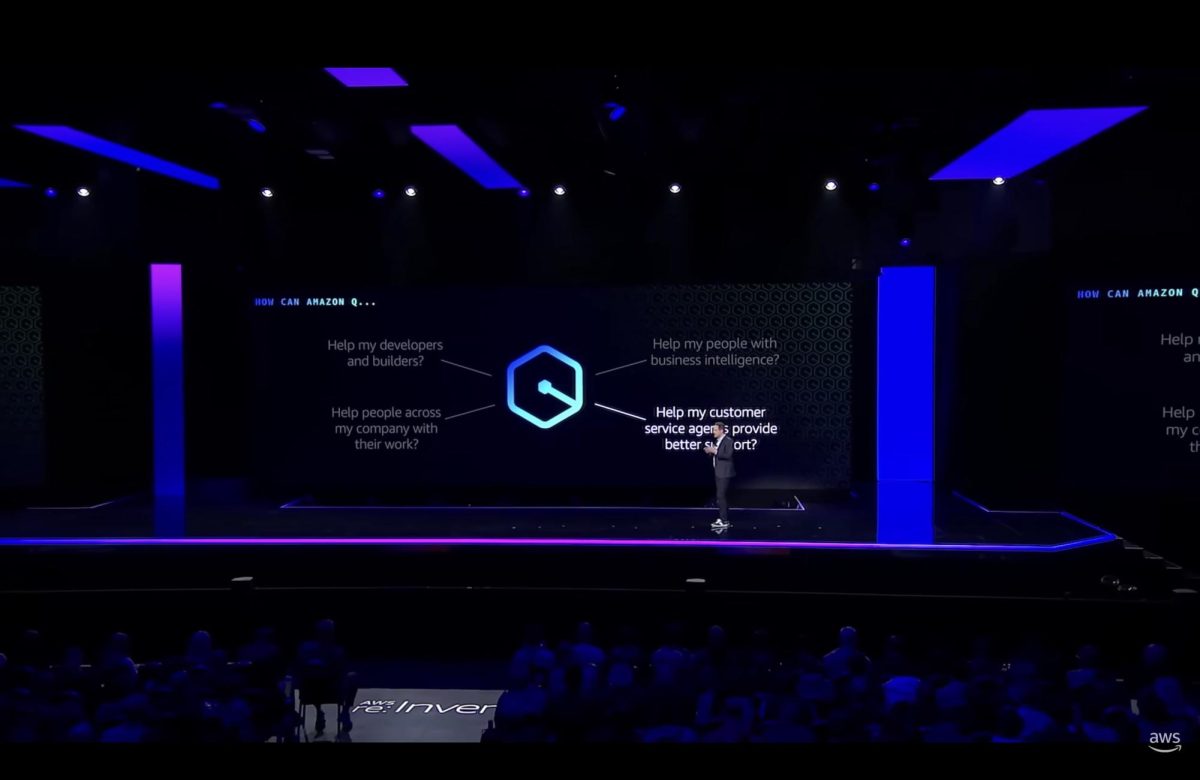Amazon.com Inc.’s cloud computing subsidiary Amazon Web Services, Inc. introduced Amazon Q, an artificial intelligence assistant for businesses, on Nov. 28.
Amazon claimed clients can ask the AI assistant questions about their business, from how internal programs work to frequent customer product complaints. The AI assistant can also be fully integrated with developer environments like Slack and other third-party applications.
A two-minute promotional video was posted to the Amazon Web Services YouTube page along with an announcement at re:Invent 2023, an annual global cloud-computing conference hosted each year by AWS — along with an extensive press release.
“This is just the start of how we’re going to help to reinvent the future of work,” AWS CEO Adam Selipsky said during his two-hour keynote. “We continue to innovate across all layers of the [generative AI] stack to bring you what you need to harness the power of generative AI for your organization.”
The announcement comes a month after AWS sales growth leveled off at 12% in the third quarter, with 12% in the second. It boasted 16% and 20% rises in 2023’s first-quarter earnings and 2022’s fourth quarter, respectively, marking a noticeable slowdown in the once rapidly expanding cloud segment.
This new launch of Amazon Q may be a move to reinvigorate growth and maintain its competitive edge in the cloud computing market. Offering advanced AI capabilities targeted at business efficiency and integration could attract new customers and deepen engagement with existing ones, potentially offsetting the recent stagnation in sales growth.
As of the second quarter, AWS remains the lead as the largest cloud computing provider for businesses. But its competitors had already announced chatbots — Alphabet Inc. with “Bard” and Microsoft Corp.’s “Copilot” — since OpenAI’s ChatGPT came on the scene a year ago on Nov. 30, 2022. AWS had been staving off concerns it was lagging behind, most recently investing $4 billion into AI startup Anthropic on Sept. 25.
Currently, AWS has a wide-ranging generative AI chatbot that can be fully integrated into business infrastructure at $20 a month, lower than both Google and Microsoft’s $30 a month chatbots that are in no way specially tailored to businesses.
“Amazon Q can be tailored to your business by connecting it to company data, information, and systems, made simple with more than 40 built-in connectors,” Amazon’s press release said.
“The cloud space, with all the technology in and around it, is too much for a single person to be an expert in,” Werner Vogels, Amazon.com’s vice president, said. “However, these AI assistants can be an expert — in all of them.”
However, just as it happened with Amazon’s competitors, Q began feeding clients highly inaccurate information, in some cases after connecting to corporate databases. Platformer reported that employees had leaked documents describing Q’s “severe hallucinations” that were leaking confidential data.
Hallucinations are recurring in the latest generation of chatbots’ large language models. Generative AI’s chances of returning an accurate response are more a “statistical likelihood” than a guarantee.
That was the explanation for hallucinations given by a report on AI’s limitations by data.world Inc., a cloud-based SaaS that processes organization data. The study said LLMs return correct answers to business queries only 22% of the time.
The day Amazon announced its new AI assistant, its stock price opened at $146.98, reached a high of $147.60, a low of $145.53 and closed at $147.03.
As the chatbot race scales to breakneck speeds, finessing the market may require bolder bets. Amazon’s bet that Q’s privacy concerns, learning curves and accuracy comorbidities won’t deter its race is one industry experts will closely evaluate in the coming months.









